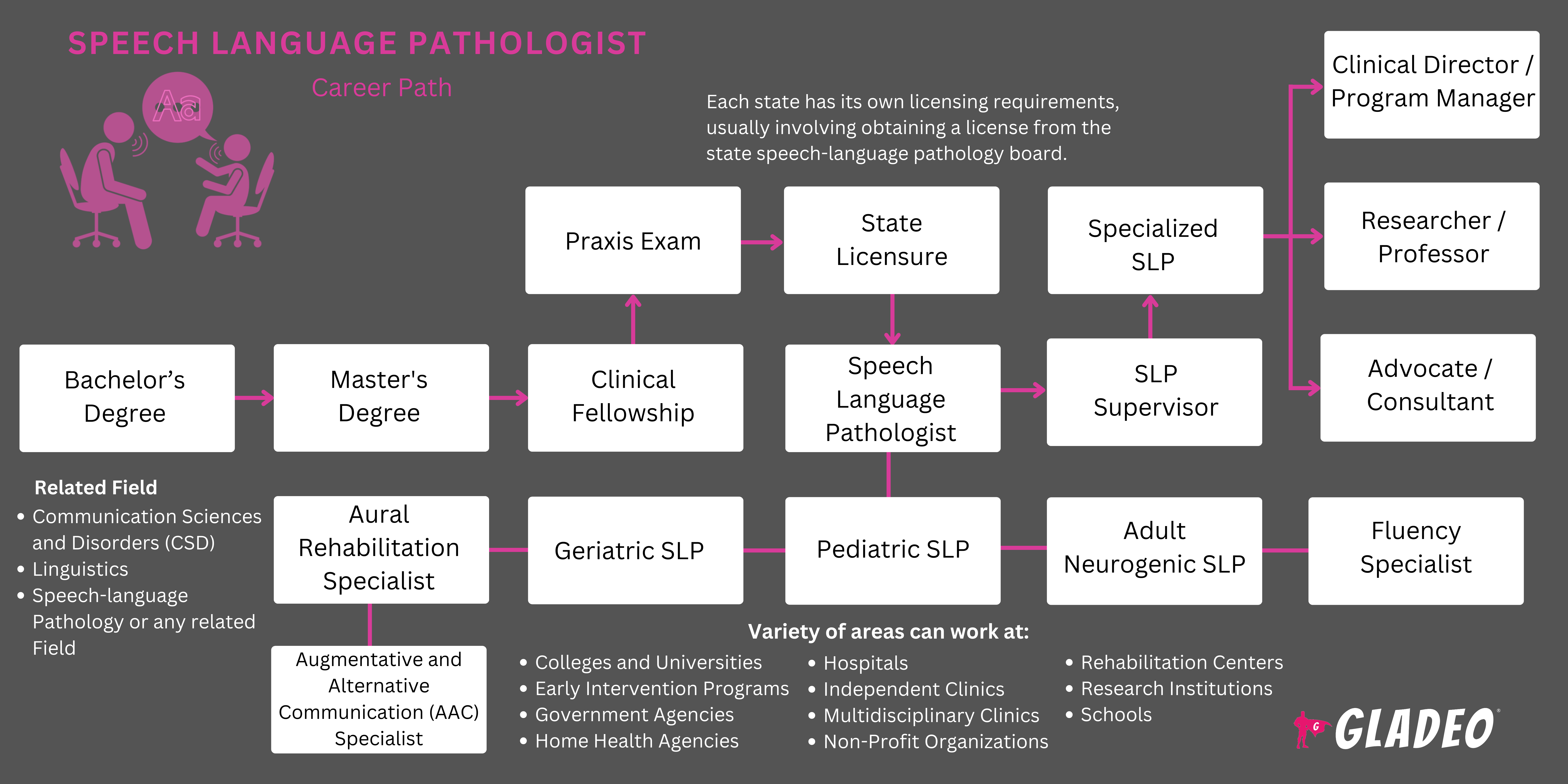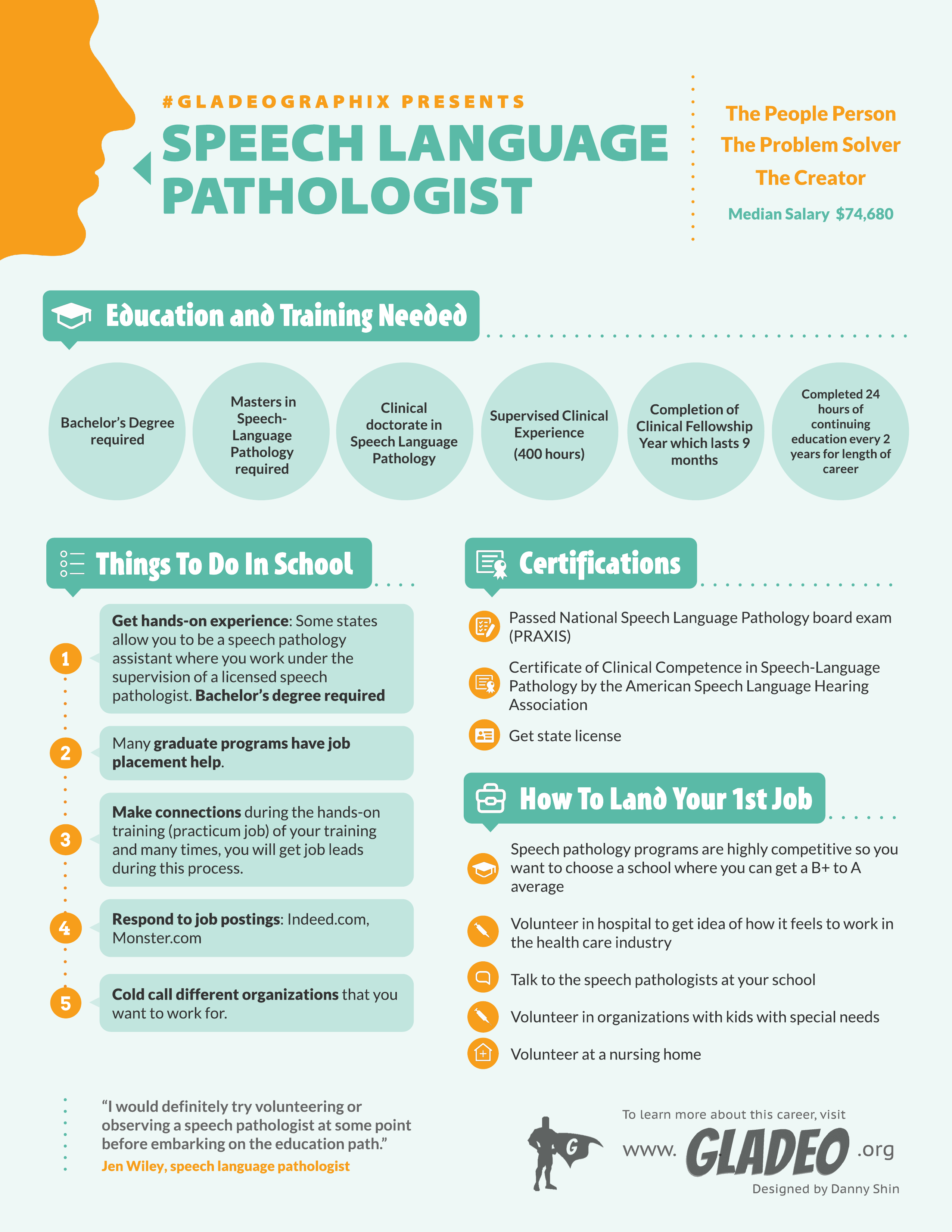Reflektory
Speech Pathologists, Speech Therapists
Speech language pathologists diagnose and treat speech, language and swallowing disorders in patients.
- Helping others and make a difference in people’s lives!
- High in demand
- Flexibility in the field: you can work part-time or full-time, work with different types of people (adults, children), different places (nursing homes, hospitals, independent), and different specialties (augmented communication (computers), head/neck cancer (more medical)).
- Regular schedule: 9 to 5, some weekends, but don’t have to be on-call or work nights like other healthcare careers.
Diagnose
- Communicate with patients to evaluate their levels of speech or language difficulty.
- Determine the extent of communication problems by having a patient complete basic reading and vocalizing tasks or by giving standardized tests.
- Identify treatment options.
- Create and carry out an individualized treatment plan.
- Evaluation of their swallowing disorder.
Treat
- Teach patients how to increase their speech clarity and be better understood.
- Teach alternative communication methods, such as using communication boards, to patients with little or no speech capability.
- Work with patients to increase their reading comprehension.
- Work with patients to increase their ability to swallow safely.
- Work with patients to improve their cognitive skills such as memory and problem-solving.
- Counsel patients and families on how to cope with communication disorders.
- Elementary, middle and high schools, colleges, and universities (public and private)
- Hospitals (public and private)
- Ośrodki rehabilitacyjne
- Placówki opieki pielęgniarskiej
- Home health care services
- Private practice: open your own office.
Growing industry, faster than the average. As the baby-boom population grows older, there will be more instances of speech language impairments. In addition, there is an increased awareness of speech and language disorders such as stuttering that will increase need for this profession.
- Need flexibility with schedule management, according to patient’s schedule.
- Need patience: sometimes work with difficult patients.
- Not much room for advancement: no promotions.
- Can be productivity requirements at facilities (hospital, nursing homes) where they make sure you bill a certain number of hours per day.
- Have to work with saliva and work in patient’s mouths.
- Can be a lot of documentation (paperwork).
- Liked helping other kids in your class. Had the patience to teach other people how to do certain things.
- Interested in working in medical career but didn’t like seeing or touching blood.
- Wanted to work with somebody one on one, personal.
- Bachelor’s Degree required: Communication Sciences and Disorders, Linguistics, Psychology, Math, or General Science.
- Speech Pathologists usually earn a master’s in Speech-Language Pathology. There is no specific major required for the bachelor’s, but graduate program prerequisites may include communication disorders, linguistics, psychology, or healthcare topics
- Graduate-level coursework may include speech and language development, speech disorders, and alternative communication
- Programs should be accredited by the Council on Academic Accreditation, which falls under the American Speech-Language-Hearing Association
- Certification options such as the American Speech-Language-Hearing Association’s Certificate of Clinical Competence in Speech-Language Pathology (CCC-SLP) feature a continuing education obligation. The CCC-SLP certification fellowship lasts ~36 weeks
- Additional certifications depend on the type of work performed. For example:
- American Sign Language Teachers Association - Certified Level Sign Language
- American Speech-Language-Hearing Association (ASHA) - Certificate of Clinical Competence in Speech-Language Pathology
- Other specialty certifications are offered by:
- Most states require Speech Pathologists to be licensed. Licensure requires graduation from an accredited program, along with supervised clinical experience (aka a fellowship) and passing the National Speech Language Pathology exam
- Each state’s requirements vary and some only require registration versus licensure
- Some states require passing the Educational Testing Service’s (ETS) Praxis examination in Speech-Language Pathology. Per ASHA, “It is recommended that individuals register and take the Praxis exam no earlier than the completion of their graduate coursework and graduate clinical practicum or during their first year of clinical practice following graduation.”
- Take college prep classes in high school, such as English, speech, biology, anatomy, human physiology, chemistry, and psychology. Physics and statistics may also be good for preparing for your undergraduate program
- College hopefuls should aim to get good grades in high school to be competitive for the best programs
- Volunteer at clinics, nursing homes, or healthcare-based community organizations to gain experience. Volunteerism also looks great on college applications and job resumes!
- Ask about helping as a teacher’s aide or camp counselor in settings where speech and language assistance is needed
- Request to do informational interviews with local Speech Pathologists
- Watch videos about what Speech Pathologists do in different settings and roles
- Decide which age groups you want to work with so you can focus your studies
- Become familiar with common medical software such as biofeedback software, Bungalow Aphasia Tutor, PENTAX Nasometer, and others
- Discover how Speech Pathologists use music, sound, and voice recognition software in their duties
- Engage with professional organizations and student clubs on campus! Read publications and stay up-to-date on trends and changes
- 0.4% with HS Diploma
- 0.6% with Associate’s
- 8.6% with Bachelor’s
- 87.2% with Master’s
- 2.7% with Doctoral

- Get hands-on experience: Some states allow you to be a speech pathology assistant where you work under the supervision of a licensed speech pathologist. They only require a bachelor’s degree. This way you can see if you want to spend the time, money and energy in getting your Master’s to become a licensed speech pathologist.
- Many have graduate programs have job placement help.
- Make connections during the hands-on training (practicum job) of your training and many times, you will get job leads during this process.
- Respond to job postings: Indeed.com, Monster.com
- Cold call different organizations that you want to work for.
- Read publications on a regular basis to keep up with what is going on in the industry.
- Going to continuing education courses, conferences.
Strony internetowe
- Alexander Graham Bell Association for the Deaf and Hard of Hearing
- American Board of Child Language and Language Disorders
- American Board of Fluency and Fluency Disorders
- American Board of Swallowing and Swallowing Disorders
- American Sign Language Teachers Association
- American Speech-Language-Hearing Association
- Council for Exceptional Children
- Council on Academic Accreditation
- International Literacy Association
- National Education Association
Książki
- But My Speech Is Fine!: Speech-Language Pathology: True Stories of a Misunderstood Profession, by Lauren Hermann
- SLP To Be: An Unofficial Guide to Getting into Graduate School for Speech-Language Pathology, by Michael Campbell
- The Heartbeat of Speech-Language Pathology: Changing the World One Session at a Time, by Phuong Lien Palafox
“I would definitely try volunteering or observing a speech pathologist at some point before embarking on the education path.” Jen Wiley, speech language pathologist
Kanał informacyjny

Polecane oferty pracy

Kursy i narzędzia online

Oczekiwane roczne wynagrodzenie
New workers start around $92K. Median pay is $109K per year. Highly experienced workers can earn around $130K. Median pay is ABOVE LIVING WAGE.
# Roczna liczba ofert pracy

There are 17100 annual job openings due to growth and turnover in this career. Jobs in this field are projected to grow over the next 5 years.








